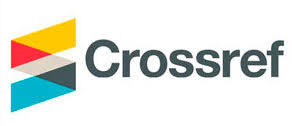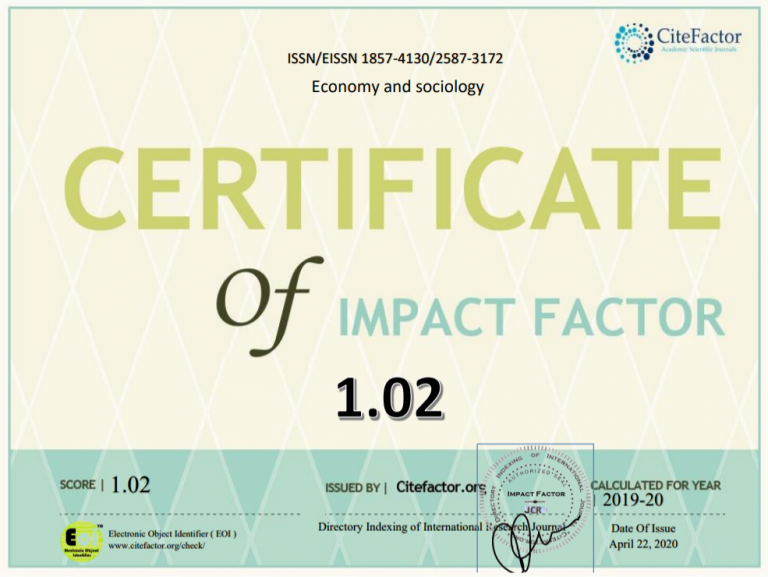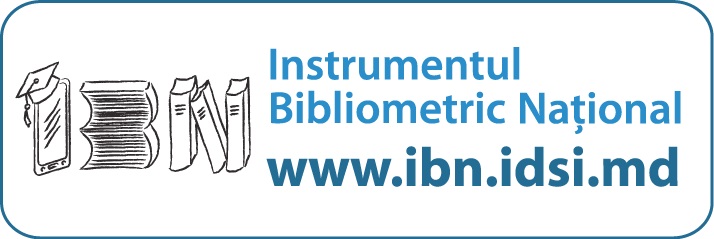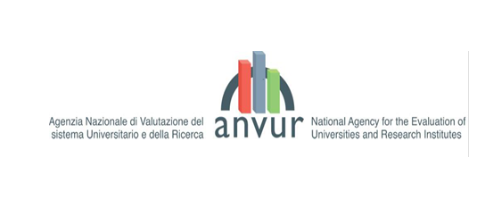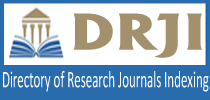INTERGENERATIONAL CARE SUPPORT TRANSFER: INSIGHTS FROM THE GENERATION AND GENDER SURVEY
DOI:
https://doi.org/10.36004/nier.es.2023.1-05Keywords:
intergenerational transfers, caregiving assistance, childcare, elderly, ageingAbstract
Understanding intergenerational transfers of childcare is crucial in the context of declining birth rates, changing family structures, and population aging. Informal assistance in childcare is highly significant for many families with young children as it helps them balance their professional and parenting responsibilities. Existing research indicates that support provided by parents to their adult children in childcare positively impacts decisions regarding childbirth and women's participation in the labor market.
The aim of this study is to analyze patterns of support transfer between different generations and identify factors influencing intergenerational transfers in Moldova. It is based on data from the "Generations and Gender" (GGS) study conducted in 2020. Thanks to its representative sample, the study encompasses aspects such as intergenerational transfers related to childcare and grandchildren, attitudes toward childcare, and socio-demographic variables. Statistical analysis involves cross-tabulations and logistic regressions to identify factors determining participation/transmission of support in childcare.
The research findings demonstrate that grandparents provide significant assistance to their adult children in childcare, particularly during the initial years of the child's life. This support is predominantly received by women with young children and women with higher education with children. Typically, childcare assistance is offered by grandparents approaching pre-retirement and retirement ages. Factors such as children's ages, family size, level of education, and urban residence significantly influence the receipt of childcare assistance. The results underscore the importance of traditional values and societal expectations, providing a nuanced understanding of intergenerational relationships amidst a changing demographic landscape. They could prove valuable for policymakers and developers of programs supporting families with children.
Downloads
References
Aassve, A., Arpino, B., & Goisis, A. (2012). Grandparenting and mothers’ labour force participation: A comparative analysis using the generations and gender survey. Demographic Research, 27, 53–84. https://www.jstor.org/stable/26349917
Albertini, M., & Kohli, M. (2013). The Generational Contract in the Family: An Analysis of Transfer Regimes in Europe. European Sociological Review, 29(4), 828–840. http://www.jstor.org/stable/24480041
Albertini, M., & Radl, J. (2012). Intergenerational transfers and social class: Intervivos transfers as means of status reproduction? Acta Sociologica 55(2), 107-123. https://doi.org/10.1177/0001699311431596
Bengtson, V. L., & Robert, E. (1991). Intergenerational Solidarity in Aging Families: An example of formal theory construction. Journal of Marriage and Family, 53(4), 856-870. https://doi.org/10.2307/352993
Chisholm, J. F. (1999). The Sandwich Generation. Journal of Social Distress and the Homeless 8(3), 177-191. https://doi.org/10.1023/A:1021368826791
Chistruga-Sînchevici, I. (2021). Echilibrul dintre muncă și viața de familie: necesități ale părinților și rolul politicilor sociale. Chișinău, INCE. https://doi.org/10.36004/nier.2022.978-9975-89-251-3
Eibich, P., & Siedler, T. (2020). Retirement, intergenerational time transfers, and fertility. European Economic Review, 124. https://doi.org/10.1016/j.euroecorev.2020.103392
Emery, T. (2013). Intergenerational transfers and European families: Does the number of siblings matter? Demographic Research, 29, 247-274. https://doi.org/10.4054/DemRes.2013.29.10
Gagauz, O., & Prohnitski, V. (2022). Gender profile of income and consumption: evidence from the national transfer accounts of Moldova. Economy and Sociology(1), 87-99. https://doi.org/10.36004/nier.es.2022.1-08
Gagauz, Olga, Chistruga-Sînchevici, Inga, Buciuceanu-Vrabie, Mariana, Rojco, Anatolii, Pahomii, Irina (2021). Impactul pandemiei COVID-19 asupra familiilor cu copii. Chişinău. http://dspace.ince.md/jspui/handle/123456789/1412
García-Morán, E., & Kuehn, Z. (2017). With strings attached: Grandparent-provided child care and female labor market outcomes. Review of Economic Dynamics, 23, 80-98. https://doi.org/10.1016/j.red.2016.09.004
Georgas, J. (2004). Family and Culture. Encyclopedia of Applied Psychology, 11-22. https://doi.org/10.1016/B0-12-657410-3/00412-8
GGS. (2020). Generations & Gender Programme. In the Republic of Moldova. UNFPA. Retrieved from https://www.ggp-i.org/moldova
Giarrusso, R., & Putney, N. (2020). Intergenerational Solidarity. Encyclopedia of Gerontology and Population Aging. Springer, Cham. https://doi.org/10.1007/978-3-319-69892-2_901-1
Gierveld, J., Dykstra, P., & Schenk, N. (2012). Living arrangements, intergenerational support types and older adult loneliness in Eastern and Western Europe. Demographic Research, 27, 167-200. https://doi.org/10.4054/DemRes.2012.27.7
Grigoraș, E. (2022). Factori asociați cu nașterea copiilor de rang diferit la femeile din Municipiul Chișinău. Calitatea Vieții, 33(3), 216–233. https://doi.org/10.46841/RCV.2022.03.04
Hagestad, G. O. (2006). Transfers between grandparents and grandchildren: The importance of taking a three-generation perspective: Transfers zwischen Großeltern und Enkelkindern – Warum es wichtig ist, eine Drei-Generationen-Perspektive einzunehmen. Journal of Family Research, 18(3), p. 315–332. https://doi.org/10.20377/jfr-298
Hank, K., & Buber, I. (2009). Grandparents Caring for their Grandchildren: Findings From the 2004 Survey of Health, Ageing, and Retirement in Europe. Journal of Family Issues, 30(1), 53–73. https://doi.org/10.1177/0192513X08322627
Ingersoll-Dayton, B. N., Neal, M. B., Hammer, L. B. (2001). Aging Parents Helping Adult Children: The Experience of the Sandwiched Generation. Family Relations, 50(3), 262-271. https://doi.org/10.1111/j.1741-3729.2001.00262.x
Kohli, M. (2004). Intergenerational transfers and inheritance: A comparative view. Annual Review of Gerontology and Geriatrics, 24(1). 266-289. https://doi.org/10.1891/0198-8794.24.1.266
Kyungmin Kim, Karen L. Fingerman, Kira S. Birditt, Steven H. Zarit. (2016). Capturing Between- and Within-Family Differences in Parental Support to Adult Children: A Typology Approach, The Journals of Gerontology 71(6) 1034–1045, https://doi.org/10.1093/geronb/gbv029
Millward, C. (1998). Family relationships and intergenerational exchange in later life. Working Paper(15).
Mureșan, C. (2012). Schimbările comportamentului familial în România. O abordare din perspectiva cursului vieții.
Peterson, B. E. (2002). Longitudinal analysis of midlife generativity, intergenerational roles, and caregiving. Psychology and Aging, (17), 161-168. https://doi.org/10.1037/0882-7974.17.1.161
Pillemer, K., Suitor, J., Mock, S., Sabir, M., Pordo, T., & Sechrist, J. (2007). Capturing the Complexity of Intergenerational Relations: Exploring Ambivalence within Later-Life Families. Journal of Social Issues, 63, 775-791. https://doi.org/10.1111/j.1540-4560.2007.00536.x
Ribar, D., & Wilhelm, M. O. (2006). Exchange, role modeling and the Intergenerational transmission of elder support attitudes: Evidence from three generations of Mexican-Americans. Journal of SocioEconomics. 35(3), 514-31. https://doi.org/10.1016/j.socec.20
Svensson-Dianellou, A., Smith, P. K., & Mestheneos, E. (2010). Family help by Greek grandparents. Journal of Intergenerational Relationships, 8(3), 249-263. https://doi.org/10.1080/15350770.2010.498737
Thomese, F., & Liefbroer, A. (2013). Child care and child births: the role of grandparents in the Netherlands. Journal of Marriage and Family 75(2), 403-421. https://doi.org/10.1111/jomf.12005

